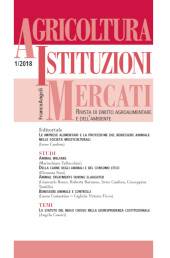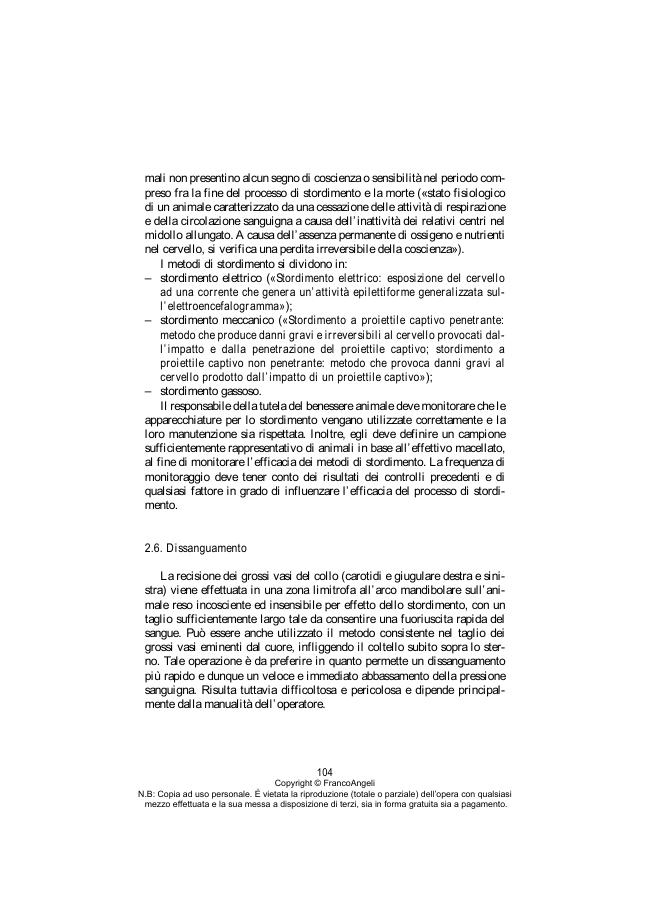I controlli sul benessere animale nelle industrie delle carni
99-108 p.
Nell'ultimo decennio il tema del benessere degli animali da reddito è stato oggetto di crescente attenzione da parte di consumatori, legislatori e società in generale. Ciò è legato non solo agli aspetti etici (rapporto uomo-animale) e sanitari (sicurezza alimentare) ma anche a quelli economici (ripercussioni sugli scambi commerciali). Per la prima volta nel Trattato di Lisbona del 13 dicembre 2007 (art. 13) viene riconosciuto agli animali lo status di "esseri senzienti" capaci di provare dolore e sofferenza e di avere vita emozionale. Viene così attribuito al benessere animale un valore comunitario fondamentale la cui tutela attiene ai doveri morali e civili di tutti i cittadini. La prima legislazione europea sul benessere animale risale al 1974, da allora si sono susseguiti trattati, accordi, direttive, regolamenti e leggi nazionali che hanno definito gli obblighi di tutti i soggetti che, a vario titolo, hanno una responsabilità nei confronti degli animali.
Al mattatoio i due regolamenti capisaldi del benessere animale sono il reg. (CE) n. 1/2005 del Consiglio del 22 dicembre 2004 sulla protezione degli animali durante il trasporto e le operazioni correlate e il reg. (CE) n. 1099/2009 del Consiglio del 24 settembre 2009 relativo alla protezione degli animali durante l'abbattimento. Le figure interessate al controllo e alla gestione del benessere animale durante le operazioni di macellazione sono: Osa (operatori del settore alimentare) e veterinari ufficiali. [Testo dell'editore].
In the last decade, the subject of the welfare of farm animals has been subject to increasing attention from consumers, legislators and society in general. This is linked not only to the ethical (human-animal relationship) and health (food safety) aspects but also to the economic ones (repercussions on trade). For the first time in the Lisbon Treaty of 13 December 2007 (art. 13) animals are granted the status of "being sentient" capable of experiencing pain and suffering and having an emotional life. Animal welfare is thus attributed a fundamental community value whose protection relates to the moral and civil duties of all citizens. The first European legislation on animal welfare dates back to 1974, since then treaties, Agreements, Directives, Regulations and National Laws that have defined the obligations of all the subjects who, for various reasons, have a responsibility towards animals have followed.
At the slaughterhouse, the two chief rules of animal welfare are the (EC) Regulation n. 1/2005 of the Council of 22 December 2004 on the protection of animals during transport and related operations and Council Regulation (EC) n. 1099/2009 of 24 September 2009 relating to the protection of animals during slaughter. The figures interested in controlling and managing animal welfare during slaughter operations are: Fio (food industry operator) and Official Veterinarians. . [Publisher's text].
Ist Teil von
Agricoltura, istituzioni, mercati : rivista di diritto agroalimentare e dell'ambiente : 1, 2018-
Artikel aus derselben Ausgabe (einzeln erhältlich)
-
Informationen
ISSN: 1971-8373
THEMENBEREICHE
KEYWORDS
- Macellazione, benessere animale, macellazioni rituali, procedura operativa standard
- Slaughter, animal welfare, ritual slaughter, standard operating procedure



